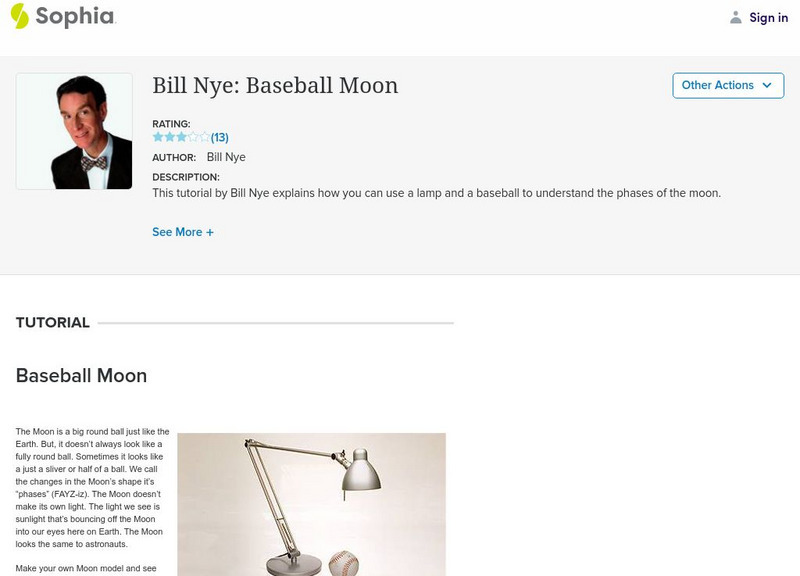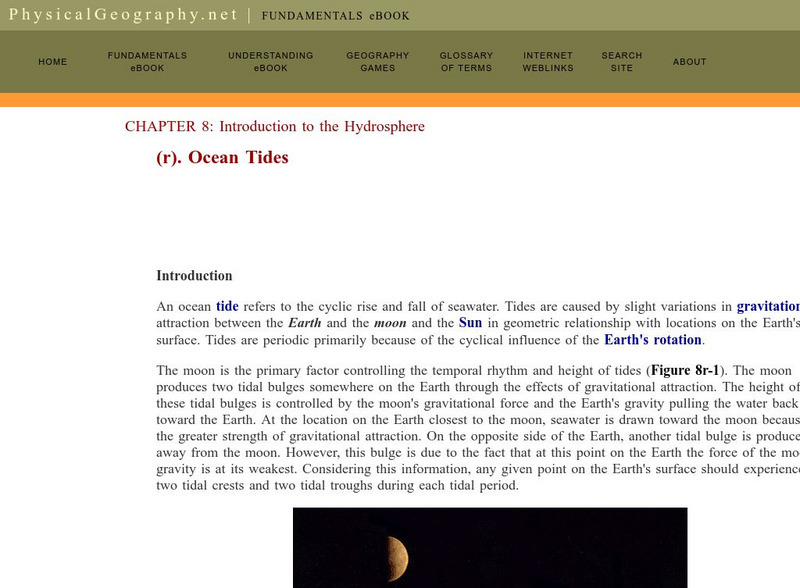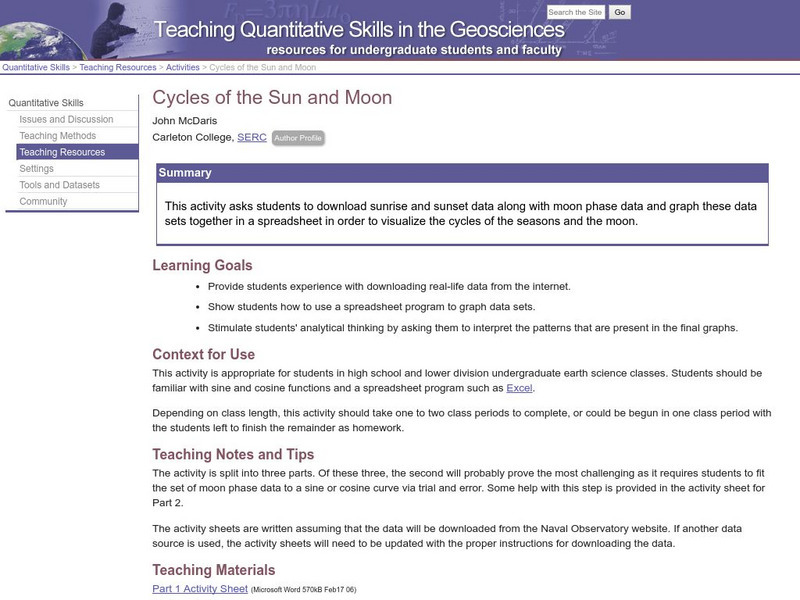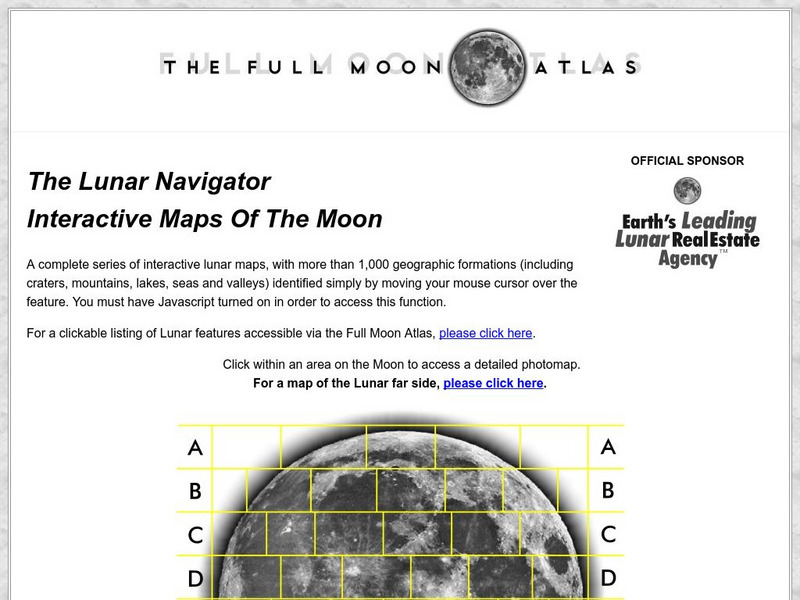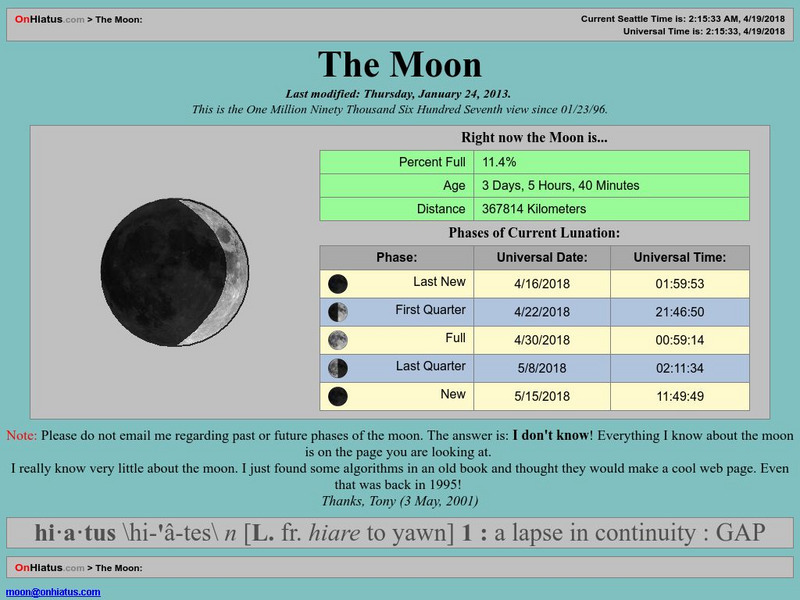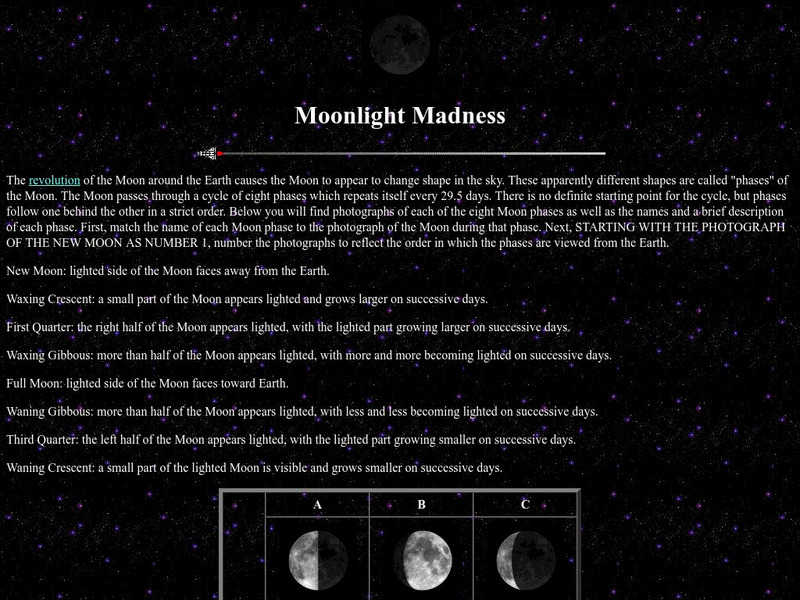Hi, what do you want to do?
Smithsonian Institution
National Air and Space Museum: Milestones of Flight
This Smithsonian National Air and Space Museum site tells the history of fight with an easy to use timeline. Also, find out about specific flights in the list of links.
Sophia Learning
Sophia: Bill Nye: Baseball Moon
Bill Nye explains the phases of the moon with an experiment using a baseball, a lamp on a table, a dark room, and a stool or chair that swivels. As the person moves around, the changes in reflected light show the phases of the moon. The...
Other
Physical geography.net: Introduction to the Hydrosphere: Ocean Tides
This is the last (18th) section of a textbook chapter on the hydrosphere. It explains what causes tides and tidal variations, describes some different types of tides, and shows on a world map where these tides occur. Includes link to a...
Utah Education Network
Uen: Moon Observations
Create a model of the moon to illustrate the various phases of the moon.
PBS
Pbs Learning Media: Explore the Moon
See what it is like to walk on the moon by viewing this collection of QuickTime images from NOVA Online. Stunning 360-degree panoramas from each of the six successful Apollo moon landings are featured.
A&E Television
History.com: When Buzz Aldrin and Neil Armstrong Were Nearly Stranded on the Moon
Aldrin saw a broken-off circuit breaker switch lying on the floor of the lunar module and "gulped hard." Following the Apollo 11 historic July 20, 1969, moonwalk, Aldrin and Neil Armstrong were preparing to return to command from their...
A&E Television
History.com: The Soviet Response to the Moon Landing? Denial There Was a Moon Race at All
Until 1989, Russians claimed they were not trying to reach the Moon first and that the U.S. was in "a one-nation race." Until 1989, a group of American aerospace engineers went to Moscow and finally saw the Soviets' failed lunar-landing...
University of California
At Home Astronomy: Hands on Science Experiments for the Entire Family
A collection of ten hands-on science experiments for the entire family that will help you understand concepts in astronomy. Make an astrolabe, find the size of the sun and moon, build a lunar settlement, find out about meteoroids, shadow...
Other
Montana State University: How Much Would You Weigh on Distant Planets?
This resource contains a lesson plan in which young scholars study the effects of gravity on the planets of the Solar System. They will view movies from the lunar Apollo missions, calculate their own weight on other planets, and propose...
US National Archives
Docsteach: Landing a Man on the Moon: President Nixon and the Apollo Program
This activity chronicles the Space Race from President Kennedy's call to land on the Moon until Apollo 17 - the last lunar Mission, placing particular emphasis on President Nixon's role in the space program.
NASA
Nasa: Eclipses
The periodicity and recurrance of eclipses is governed by the Saros cycle, a period of approximately 6,585.3 days (18 years 11 days 8 hours). It was known to the Chaldeans as a period when lunar eclipses seem to repeat themselves, but...
Khan Academy
Khan Academy: The Bodhisattva Avalokiteshvara
The main image in this painting is Avalokiteshvara (1), the Bodhisattva of Compassion. He is the principle patron deity of Tibet. He sits on a lotus throne upon a lunar disc. This god takes many forms, such as the Dalai Lamas of Tibet,...
A&E Television
History.com: 5 Terrifying Moments During the Apollo 11 Moon Landing Mission
The astronaut crew had to troubleshoot a series of problems throughout the historic 1969 flight. This historic exchange on July 20, 1969 marked the end of a perilous journey to the lunar surface, but a multitude of threats still faced...
A&E Television
History.com: How Many Times Has the u.s. Landed on the Moon?
Among seven Apollo moon landing missions, only one did not land men on the moon. Apollo 11 lunar module on July 20, 1969 to become the first human being to step foot on the moon. "That's one small step for man, one giant leap for...
Smithsonian Institution
National Air and Space Museum: Apollo 13
This site contains facts and images pertaining to the crew, spacecraft, and mission of Apollo 13.
Science Education Resource Center at Carleton College
Serc: Using Oreo Cookies to Discover the Moon Phases
Students will understand the phases of the moon by scraping away the frosting from the inside of Oreo cookies, and placing them in moon phase order.
Science Education Resource Center at Carleton College
Serc: Cycles of the Sun and Moon
Students download sunrise and sunset data along with moon phase data, and graph these data sets together in a spreadsheet in order to visualize the cycles of the seasons and the moon.
University of Hawai'i
Exploring Planets in the Classroom: Impact Craters
Visit this site for a lesson plan on impact craters. Using this simple hands-on activity, young scholars further develop their understanding of how impact craters are formed. A brief introduction about impact craters is given along with...
Woods Hole Oceanographic Institution
Whoi: What Causes Tides?
The Woods Hole Oceanographic Institute provides an in-depth but easy to read article on the role of the moon and the sun in respect to tides.
Other
The Full Moon Atlas
Find any location on the moon, including the dark side through this interactive full moon atlas. Click on any segment and mouse over the images to find the names of key geographic features. You can even go to the homepage to translate...
Other
On Hiatus: The Moon
This commercial site [without any advertising] provides a diagram of the current illumination of the Moon, and the dates of the most recent and upcoming New, Quarter, and Full Moon phases. All dates and times are in universal Time, only.
NASA
Nasa Star Child: Moonlight Madness
The revolution of the Moon around the Earth causes the Moon to appear to change shape in the sky. These apparently different shapes are called "phases" of the Moon. The Moon passes through a cycle of eight phases which repeats itself...
Other popular searches
- Lunar Exploration
- Lunar Eclipse
- Lunar Phases
- Lunar Cycles
- Solar and Lunar Eclipses
- Lunar Myths
- Lunar New Year
- Lunar Calendar
- Lunar Landing
- Solar Eclipse Lunar Eclipse
- Lunar and Solar Eclipse
- The Lunar New Year






